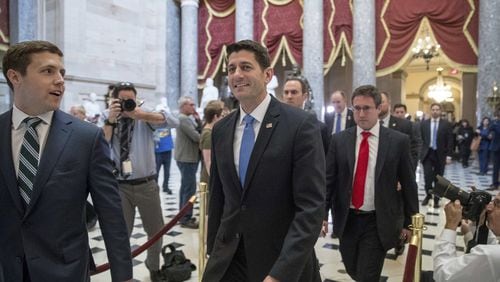After months of false starts, arm twisting and political infighting, House Republicans finally passed legislation on Thursday to fulfill their longtime campaign promise of repealing and replacing the Affordable Care Act.
Now comes the hard part.
The GOP bill, known as the American Health Care Act, which the House narrowly approved 217 to 213, now crosses the Capitol, where U.S. senators are eager to renegotiate large swaths of it.
As it stands now, the bill could have a dramatic impact on tens of thousands of Georgians — putting some at risk of losing their insurance. Others could gain access to tax credits that they don't qualify for under Obamacare because their incomes are too high.
Republicans say the legislation represents a better alternative to Obamacare that will help inject more competition into the marketplace, helping lower skyrocketing health care premiums and giving people more choices. It would also cut roughly $880 billion in Obamacare tax increases, mostly for the wealthy, and decrease the deficit.
RELATED: 5 Things to know about the GOP health bill
IN-DEPTH: GOP plan could hurt Georgia Trump voters
But moderate conservatives in the House and Senate — along with Democrats — worry it could strip millions of Americans of their health coverage.
House passage of the bill was no small victory for President Donald Trump, House Speaker Paul Ryan and Republican leaders. It gets them a major step closer to fulfilling a core campaign promise and and provides a boost to ambitious GOP plans to overhaul the tax code and infrastructure projects.
But it will be a long slog before any health care legislation makes it to Trump’s desk, and there’s no guarantee that Congress can reach any consensus at all.
“The journey continues,” Trump said at a celebratory news conference in the White House Rose Garden Thursday afternoon. “We will get it done. We will have great, great health care for everyone in our nation.”
Democrats, meanwhile, derided the bill’s passage and warned it would ultimately cost Republicans in next year’s election.
Under the original version of the bill, an estimated 24 million Americans would lose their health insurance coverage by 2026, according to a report by the nonpartisan Congressional Budget Office.
IN DEPTH: How the Republican health care bill will impact every Georgia county
“It’s just a terrible bill that is going backwards and anybody who votes for it, as Nancy Pelosi said, is tattooing their forehead and voters are going to remember what those Republicans in the House are doing today in 2018,” said U.S. Rep. Hank Johnson, D-Lithonia.
Nearly every major national health care group, including the American Medical Association and AARP, is opposed to the bill.
The House vote
After failing to pass the bill in March, GOP leaders in recent weeks added a series of amendments aimed at appeasing hard-line conservatives who thought the original version didn’t go far enough in gutting Obamacare.
It proved just enough to secure a narrow victory.
On Thursday, the GOP House bill passed with zero Democrats voting in favor and 20 Republicans voting against it. Members of Georgia’s congressional delegation voted strictly along party lines.
Rep. Buddy Carter, R-Pooler, said Thursday he was “thrilled” by the bill’s passage.
“This bill guts Obamacare and I urge my colleagues in the Senate to act swiftly to let families and patients across America know that help is on the way,” Carter said in a statement.
The margin of error is even smaller in the Senate where Majority Leader Mitch McConnell must contend with an unruly, divided caucus and arcane budget rules that limit what can be included in the legislation.
Still, Trump said Thursday he is “confident” Obamacare repeal will advance.
What it means for Georgia
Much is at stake for the Peach State.
About half a million Georgians have Obamacare coverage and the majority get tax credits to help them afford that insurance. Under the GOP plan, however, many could lose out on thousands of dollars in credits, forcing some to drop coverage.
Bill Custer, a health care expert at Georgia State University, said the Republican bill has moved so fast that no one knows in detail what the impact would be. But it would be at least as massive as the previous proposal, he said, with perhaps 700,000 Georgians losing their health insurance.
In any case, the financial impacts to Georgians will be significant. Some will feel freed of having to pay for health insurance they don’t want. Others will want it and not be able to buy it.
The GOP bill offers tax credits, like Obamacare does, but those credits would be based on people’s age rather than income. That would benefit younger, higher-income Americans and mean less financial help for poorer, older individuals, especially those living in rural areas.
Georgians with pre-existing conditions, such as someone who has had a heart attack or cancer, could also be hit hard. That’s because the bill would allow states to opt out of the Obamacare mandate that insurers not charge people with a poor health history higher premiums.
Nearly 1.8 million Georgians under age 65 have a pre-existing condition, according to the nonpartisan Kaiser Family Foundation. Most get coverage through work or other source, but those who buy their own coverage on the individual insurance market could face higher prices.
A last-minute amendment to the bill, which sought to allay concerns about covering people with pre-existing conditions, added an extra $8 billion over five years to a fund that states could use to help cover sicker, more expensive patients. Under this, states could set up high-risk pools to cover those patients. Traditionally, such pools have been too expensive for states to operate, and even Republicans have questioned whether the funding allotted would be enough to cover everyone.
The bill would also let states opt out of the Obamacare requirement that insurers provide certain “essential” health benefits, such as maternity care and mental health treatment, which Republicans say will help bring premiums down.
It would also fundamentally change how the federal government pays states for Medicaid. Instead of paying states per person, it would allow states to opt for lump sum payments and give them more flexibility in who the program covers.
“This will be devastating for Georgia children, for Georgia families, for Georgia seniors,” said Cindy Zeldin, director of Georgians for a Healthy Future, a patient advocacy group. “It’s really critical that this be stopped or dramatically changed in the Senate.”
On to the Senate
One of the biggest factors that will shape the Senate debate has to do with math.
The chamber’s budget rules that allow for a bill to avoid a Democratic filibuster require McConnell to avoid any provisions that would add to the deficit. The GOP is clinging onto a 52-seat majority and can only afford to lose two Republican votes.
The chamber’s Republican conference is just as divided as the House’s was, which means leaders may need to undertake even more political gymnastics in order to keep centrists and the Senate’s most ardent conservatives on board.
“I do want to vote for a repeal bill, but I’m still troubled by the fact that there are hundreds of billions of dollars in this bill that will go from the Treasury, from the taxpayers’ money, to insurance companies,” Sen. Rand Paul, R-Ky., told reporters Thursday.
Another internal fault line is between the Republican-leaning states that expanded Medicaid under Obamacare and those that didn’t, such as Georgia. Senators from non-expansion states want to make sure they’re not penalized for their previous decision, while lawmakers from those that did want to make sure people who gained coverage under the expansion don’t lose it.
If the GOP wants to make expansive changes to health care policy, they will also need win over at least eight senators from across the aisle, but Democrats say they will only negotiate if Republicans drop their pledge to scrap Obamacare.
Both of Georgia’s Republican senators, Johnny Isakson and David Perdue, haven’t made definitive statements on how they’d vote on the measure but indicated they’re supportive of its underlying principles. Both have propagated the need to work with Democrats on the issue.
“There’s a great chasm up there, and I would argue that polarization is one of our great threats to solving a problem,” Perdue said during a recent speech in Brookhaven. “I believe there’s no danger to finding a compromise solution. That’s what I said when I ran and I believe it.”
Georgia House members weigh in on GOP health bill
Republicans
U.S. Rep. Austin Scott, R-Tifton:
“I do not think the bill is perfect, but I’m going to vote for the bill. One of the key problems in the system today is the cost of health care. The more health care costs, the more health insurance is going to cost, so we’re going to continue to work to try to put more competition in the health care system. That hopefully will reduce the cost and that will also be reflected in people’s insurance premiums.”
U.S. Rep. Doug Collins, R-Gainesville:
Health care “is hard to deal with. It’s not going to come out quick or easy. What we needed here was not just the quick and easy, we needed the right and I think we got it as right as we can to get it out of the House.”
Democrats
U.S. Rep. John Lewis, D-Atlanta:
“Today we are facing a crossroads in the history of this nation. One day our children and our children’s children may turn to us and ask, ‘Which side were you on?’ In the aftermath of this vote, members of the House will have to look their constituents, their friends, their family and even their children in the eyes and tell them the painful truth.”
U.S. Rep. Hank Johnson, D-Lithonia:
“I’m expecting for this bill to die in the Senate because I’m expecting the American people to come out and let their senators know that they won’t stand for this deprivation of their health care.”
Here’s what comes next
What now?
The Senate plans to take up the Republican health care bill, the American Health Care Act, now that it’s advanced through the House. Both chambers will need to pass the same version of the legislation before it can be sent to President Trump’s desk.
What’s the timeline?
There doesn’t appear to be one. The office of Senate Majority Leader Mitch McConnell said only that the chamber will wait for Congress’ budget scorekeeper to estimate the cost of the House-passed bill before it acts. Realistically, it could took weeks — or perhaps months — for the chamber to act.
A working group has reportedly been meeting for weeks to try and build some consensus among politically disparate Senate Republicans. What is not clear is whether McConnell would choose to bring the legislation through the regular committee process or fast-track it by negotiating in private.
Who are the key players?
McConnell and his Democratic counterpart, Chuck Schumer of New York, will of course be critical actors, as will Republicans Lamar Alexander and Orrin Hatch, who lead key health care-related committees.
Just as important will be moderate Republicans from states that have expanded Medicaid under Obamacare: Rob Portman of Ohio, Susan Collins of Maine and Lisa Murkowski of Alaska. They have been skeptical of the House GOP bill because of constituents who could lose coverage.
The Senate’s staunchest conservatives have also raised concerns about the original GOP health care bill because they say it doesn’t go far enough in repealing Obamacare. Those players include Rand Paul of Kentucky, Ted Cruz of Texas and Mike Lee of Utah.
It’s also worth watching centrist Democrats who are running for reelection in states Trump won in 2018: Joe Manchin of West Virginia, Joe Donnelly of Indiana and Claire McCaskill of Missouri. They could be more inclined to work with Republicans on some sort of middle-of-the-road agreement.







